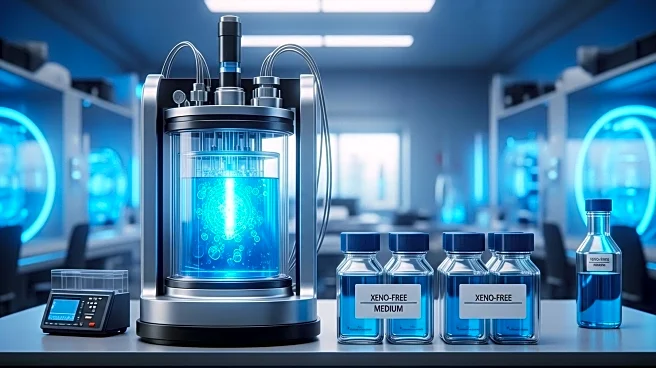What is the story about?
What's Happening?
Takara Bio Europe has launched a new product, Cellartis MSC EV Wonder, designed to improve the production of extracellular vesicles (EVs) from human mesenchymal stem cells (MSCs). This xeno-free medium aims to address the challenges in scalable EV production, offering a nine-fold increase in yield compared to traditional methods. The formulation is phenol red-free and uses the same basal medium as the Cellartis MSC Xeno-Free Culture System, facilitating a smooth transition from MSC expansion to EV production. The product is engineered to maintain essential MSC-EV features, ensuring reproducible results and supporting GMP manufacturing for clinical applications.
Why It's Important?
The introduction of Cellartis MSC EV Wonder is significant for the field of regenerative medicine, where MSC-derived EVs are gaining attention as promising therapeutic candidates. These vesicles offer regenerative and immunomodulatory benefits without the risks associated with using intact MSCs. By providing a reliable and scalable solution for EV production, Takara Bio Europe is addressing a major bottleneck in the industry, potentially accelerating the development and clinical application of EV-based therapies. This advancement could benefit researchers and healthcare providers by streamlining workflows and ensuring consistent quality in EV production.
What's Next?
With the launch of Cellartis MSC EV Wonder, Takara Bio Europe is poised to influence the future of EV-based therapies. The product's ability to enhance EV production and maintain quality may lead to increased adoption in clinical settings. Researchers and manufacturers are likely to explore its applications in various therapeutic areas, potentially leading to new treatments and innovations in regenerative medicine. As the industry continues to evolve, Takara Bio Europe's product could play a crucial role in advancing the use of MSC-EVs in clinical applications.
Beyond the Headlines
The development of Cellartis MSC EV Wonder highlights the growing interest in cell-free therapies, which offer a safer alternative to traditional stem cell treatments. This shift could lead to broader acceptance and integration of EV-based therapies in healthcare, potentially transforming treatment paradigms. Ethical considerations around the use of stem cells may also be mitigated, as EVs do not involve the use of intact cells, reducing associated risks and controversies.


















